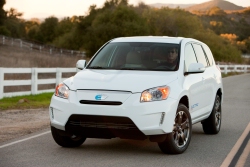 By John Addison (updated 9/17/11; original 11/19/10 from LA Auto Show)
By John Addison (updated 9/17/11; original 11/19/10 from LA Auto Show)
No other hybrid comes close to the 50 miles per gallon (mpg) of the Toyota Prius. Customers have bought over 2 million Prii; no other hybrid comes close. No other automaker now offers more choices in hybrids, plug-in hybrids, and electric vehicles.
Auto makers have had 11 years since Toyota introduced the Prius to the U.S. to surpass Toyota’s best mileage and lowest carbon emissions. As I look at hundreds of cars in this vast L.A. convention center, no hybrid comes close. Only the more expensive electric cars and plug-in hybrids, including several models from Toyota can beat the Prius. Toyota customers also continue to buy the Toyota Highlander Hybrid SUV and the Toyota Camry Hybrid.
Toyota Motor Corporation (TMC) is not resting on its laurels. TMC plans to introduce 11 hybrids by the end of 2012, consisting of all-new models and redesigned models. Of the planned new models, one is a compact with achieving a jaw-dropping 94 mpg (40 km/L) under the 10-15 Japanese test cycle.
The Prius is now a family of four with the official name of Prii – the best selling Prius Liftback, the larger Crossover SUV Prius V, and the smaller better mpg Prius C.
Five Stunning Lexus Hybrids
Lexus, a TMC company, now offers five different hybrids for premium car buyers looking for hybrid mileage or extra performance. The beautiful new Lexus CT200h will deliver 42 mpg EPA combined mileage. Deliveries start in March 2011. Premium SUV drivers can get 30 mpg with the RX450h. The electric motor in a hybrid can be used for performance, rather than fuel economy, as I learned last year taking the Lexus HS250h around the track at Laguna Seca. Performance enthusiasts can get their own custom kit GS450h or LS600h hybrids.
Toyota Readies 3 Electric Cars for 2012 Dealer Sales
Prius Plug-in Hybrid starts at $32,000. The fully loaded Advanced is $39,525. Toyota will start taking online reservations in a few weeks with an online configurator allowing selection of options and colors. The Prius Plug-in cost about $8,000 less than the Chevrolet Volt, a plug-in hybrid with a 40-mile electric range in comparison to the Prius PHV’s 15-mile. After federal tax credits, the difference narrows to only $3,000. The Prius Plug-in costs about $8,500 more than the classic Prius Liftback, but the difference narrows to $6,000 after Federal Tax Credit.
The RAV4 EV Powered by Tesla was Toyota’s center stage announcement here at the Los Angeles Auto Show. In 1997, 1,484 RAV4 EVs were sold. Remarkably half of these early EVs are still in use and their owners love them. Toyota, which owns 2 percent of Tesla, is bringing back this popular SUV in a stylish new body. It will have an electric range of 80 to 110 miles using 30 to 40 kWh of Panasonic battery cells integrated into a Tesla pack – impressive for an SUV. The body will be built by Toyota in Canada, the drive system by Tesla in California, and the final assembly site has yet to be determined.
In 2012, the Scion IQ EV, a stylish city car will also be introduced in the U.S., Japan and Europe to compete with the Mitsubishi i, the Honda Fit EV, and the Smart ED.
Toyota’s Future Advanced Energy Storage
Toyota is putting 100 electric SUVs on the road each with a range of over 400 miles. Fleets will include the Port Authority of New Jersey, San Hydro, my Alma Mater University of California at Irvin and other fleets that have 10,000 psi hydrogen fueling stations. TMC is continuing development of a sedan-type fuel-cell hybrid vehicle (FCHV), with sales aimed to start in around 2015 in Japan, the U.S. and Europe. I was impressed with my test drive of the previous generation Toyota FCHV.
TMC is researching development of next-generation secondary batteries with performance that greatly exceeds that of lithium-ion batteries. Such research is aimed to help bring about the revolutionary advances in battery performance that will be necessary for the broad adoption of electric-motor-propelled eco-cars.
- Solid-state batteries: TMC has successfully reduced what is known as particle resistance and has made progress toward creating full solid-state batteries in a promising compact package.
- Metal-air batteries: TMC has determined the reaction mechanism of lithium-air batteries and has clarified its research policy regarding the batteries as rechargeable secondary batteries.
- TMC established a division charged with studying production of next-generation batteries. The division, with a staff of approximately 100 researchers, is accelerating its research.
TMC believes that eco-cars can have a positive impact on the environment only if they are widely used. TMC will continue to improve the fuel efficiency of its conventional combustion-engine cars, which account for the majority of its sales, while raising performance, reducing costs and expanding the company’s product lineup. Within these efforts, hybrid technologies—consisting of the basic technologies necessary for development of various eco-cars—are positioned as key technologies to achieve both high fuel efficiency and driving performance, and to facilitate the use of various fuels with the aim of creating a low-carbon society through response to the need to diversify energy sources.
Toyota plans to extend its leadership in hybrid cars, to being the market share leader in plug-in hybrids and electric cars.
